Abstract
OBJECTIVES: The purposes of this analysis were to compare the self-reported willingness of blacks, Puerto-Rican Hispanics and whites to participate as research subjects in biomedical studies, and to determine the reliability of the Tuskegee Legacy Project Questionnaire (TLP). METHODS: The TLP Questionnaire, initially used in a four-city study in 1999-2000, was administered in a follow-up study within a random-digit-dial telephone survey to a stratified random sample of adults in three different U.S. cities: Baltimore, MD; New York City; and San Juan, PR. The questionnaire, a 60-item instrument, contains two validated scales: the Likelihood of Participation (LOP) Scale and the Guinea Pig Fear Factor (GPFF) Scale. RESULTS: Adjusting for age, sex, education, income and city, the LOP Scale was not statistically significantly different for the racial/ethnic groups (ANCOVA, p=87). The GPFF Scale was statistically significantly higher for blacks and Hispanics as compared to whites (adjusted ANCOVA, p<0.001). CONCLUSIONS: The of the findings from the current three-city study, as well as from our prior four-city study, are remarkably similar and reinforce the conclusion that blacks and Hispanics self-report that, despite having a higher fear of participation, they are just as likely as whites to participate in biomedical research.
Full text
PDF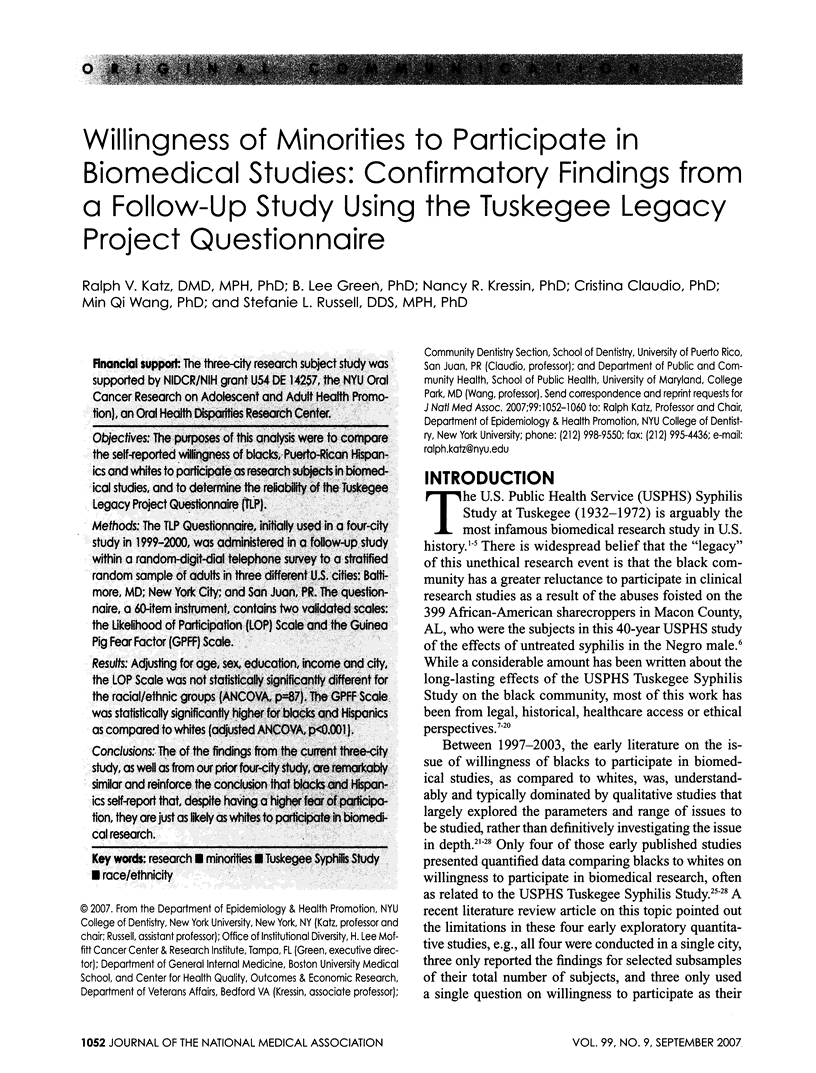
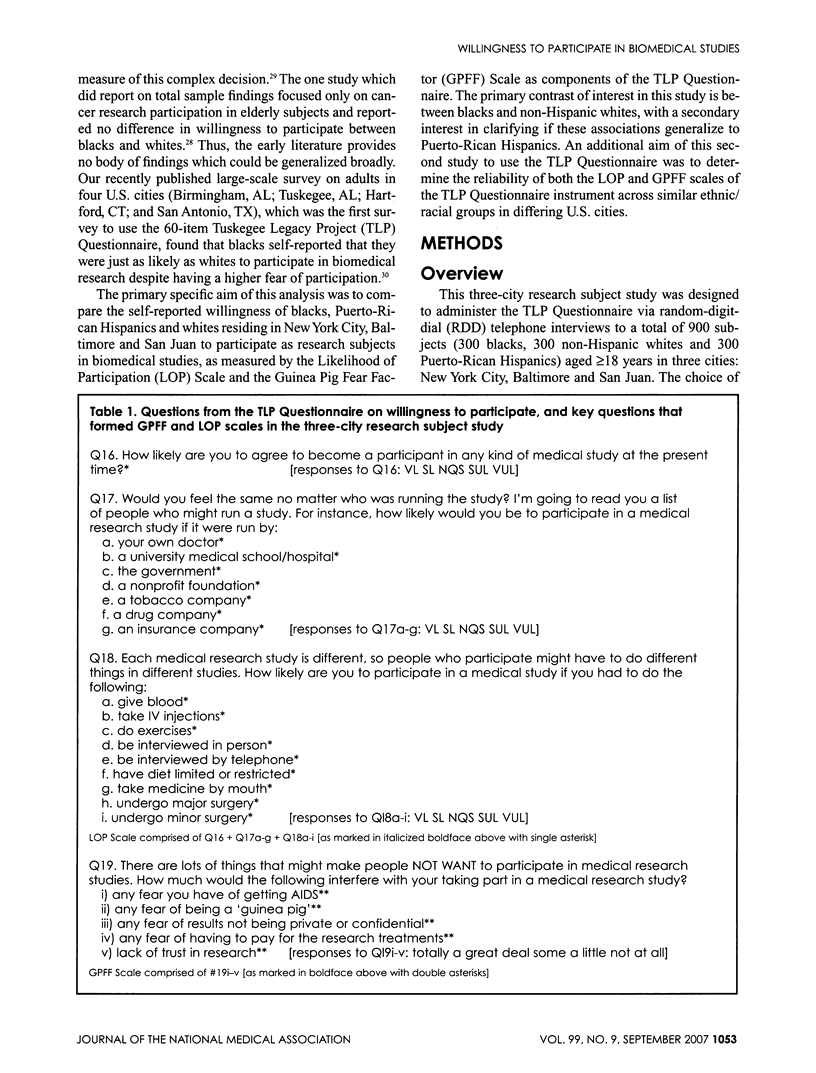
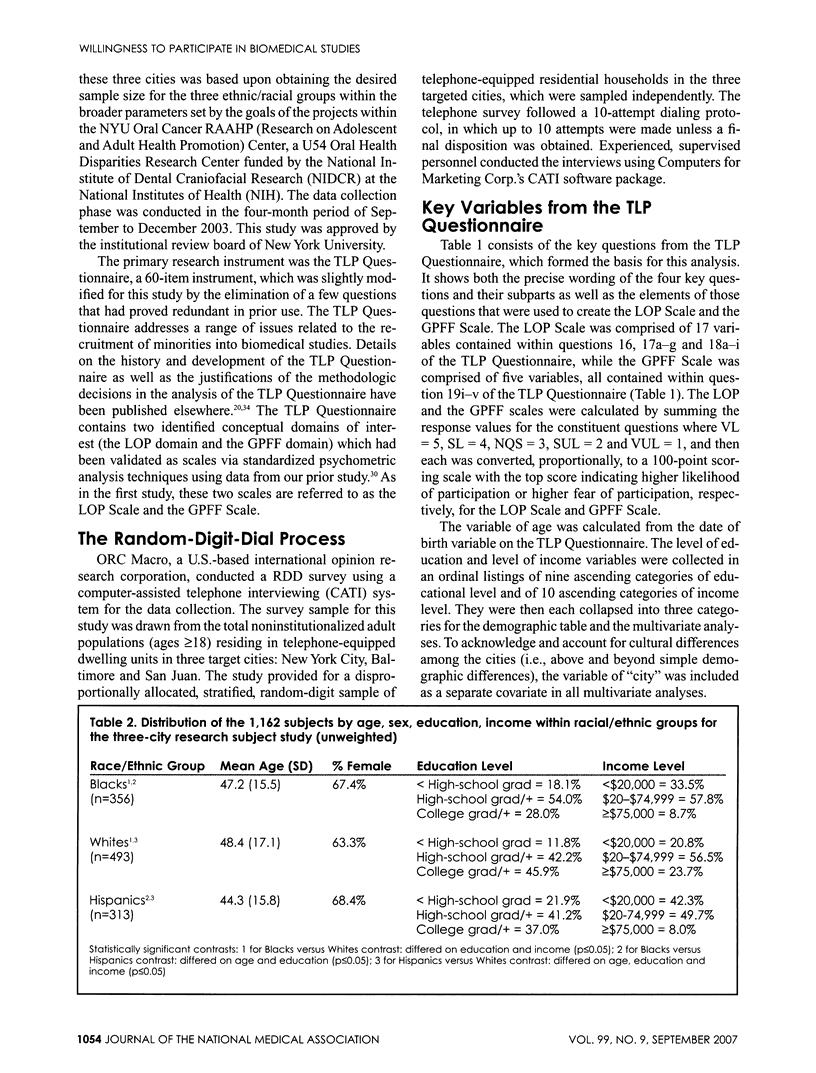
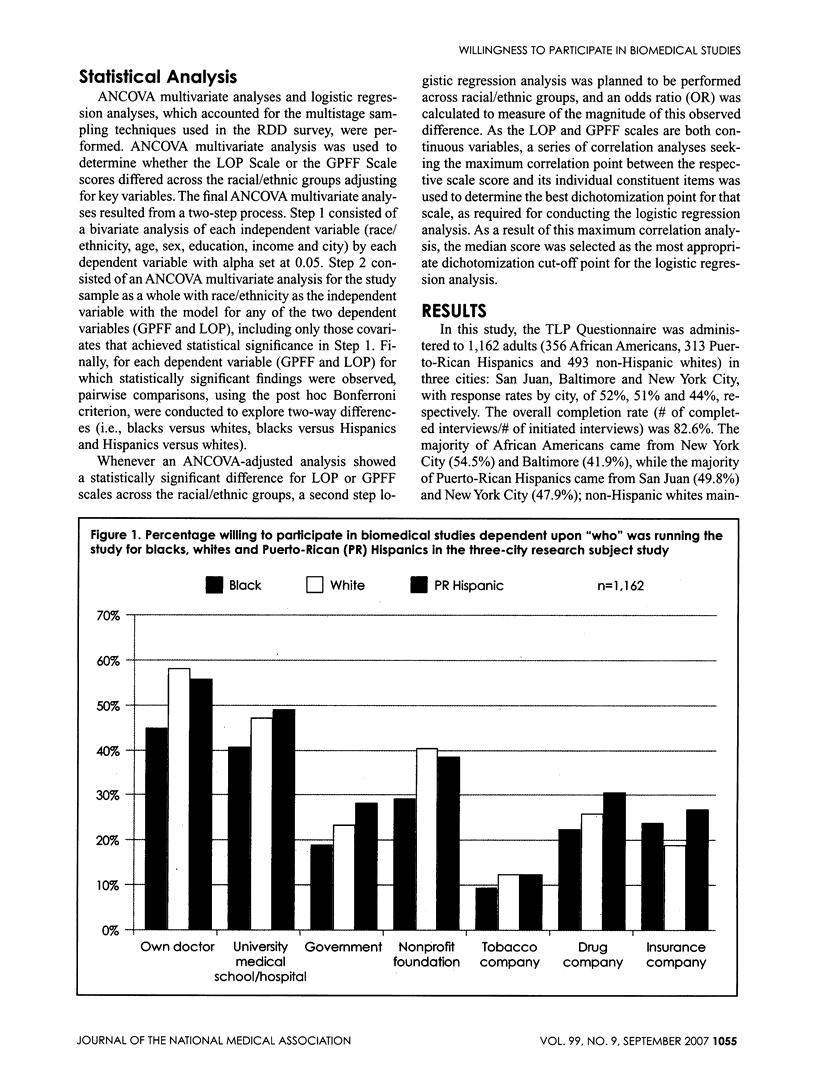
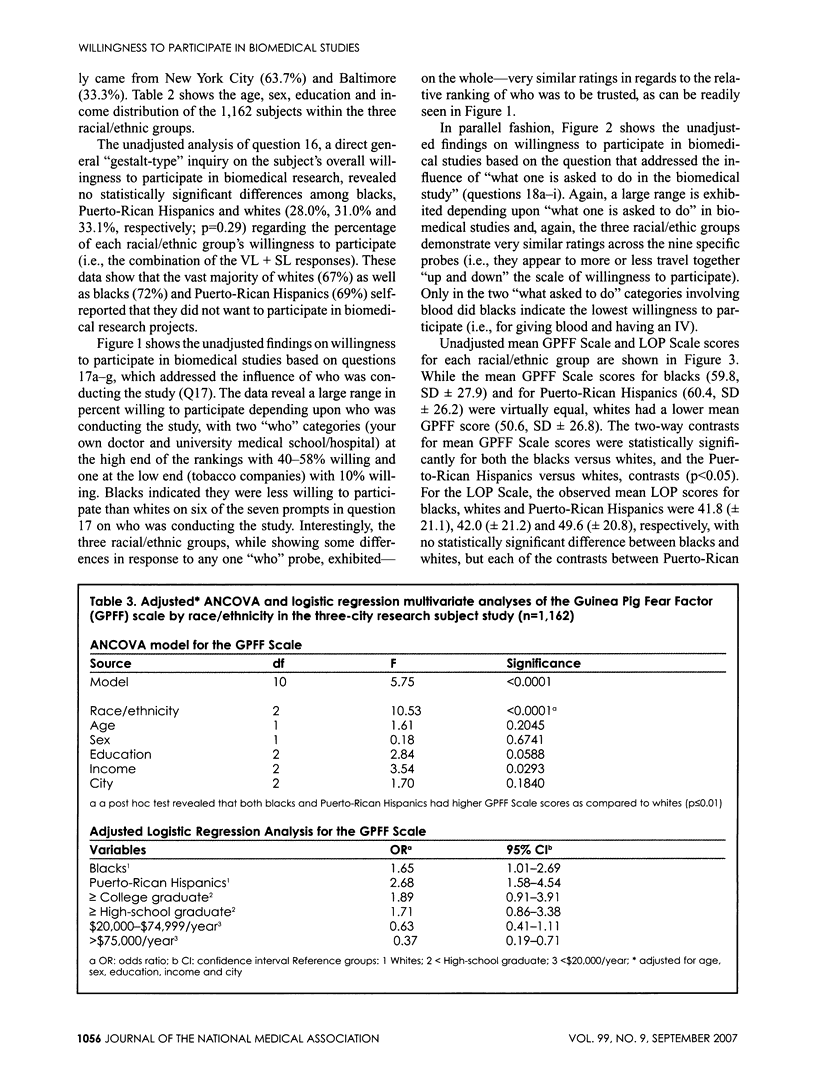
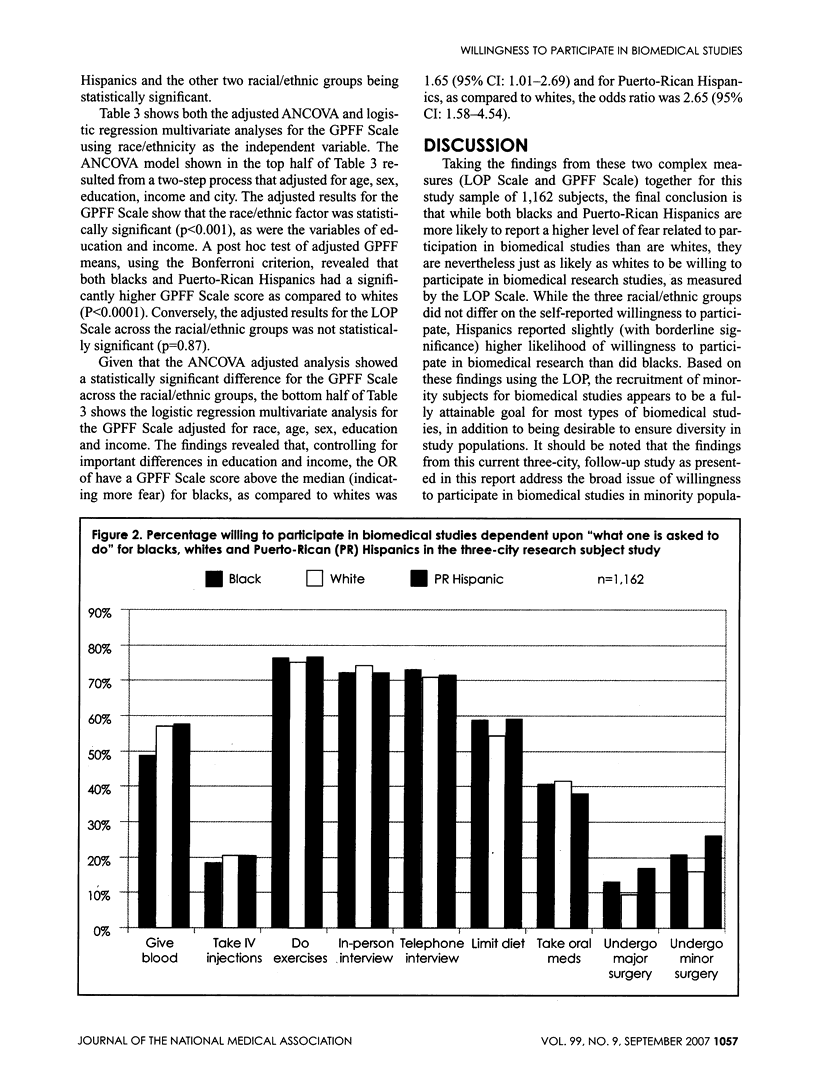
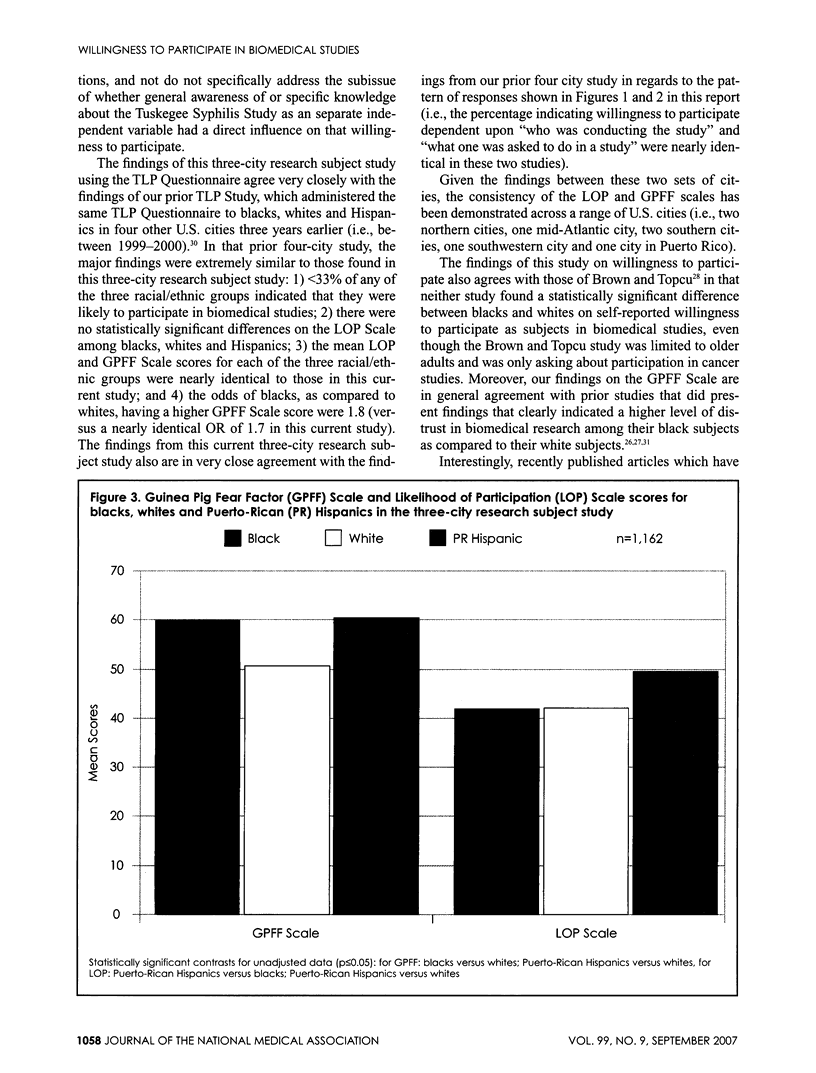
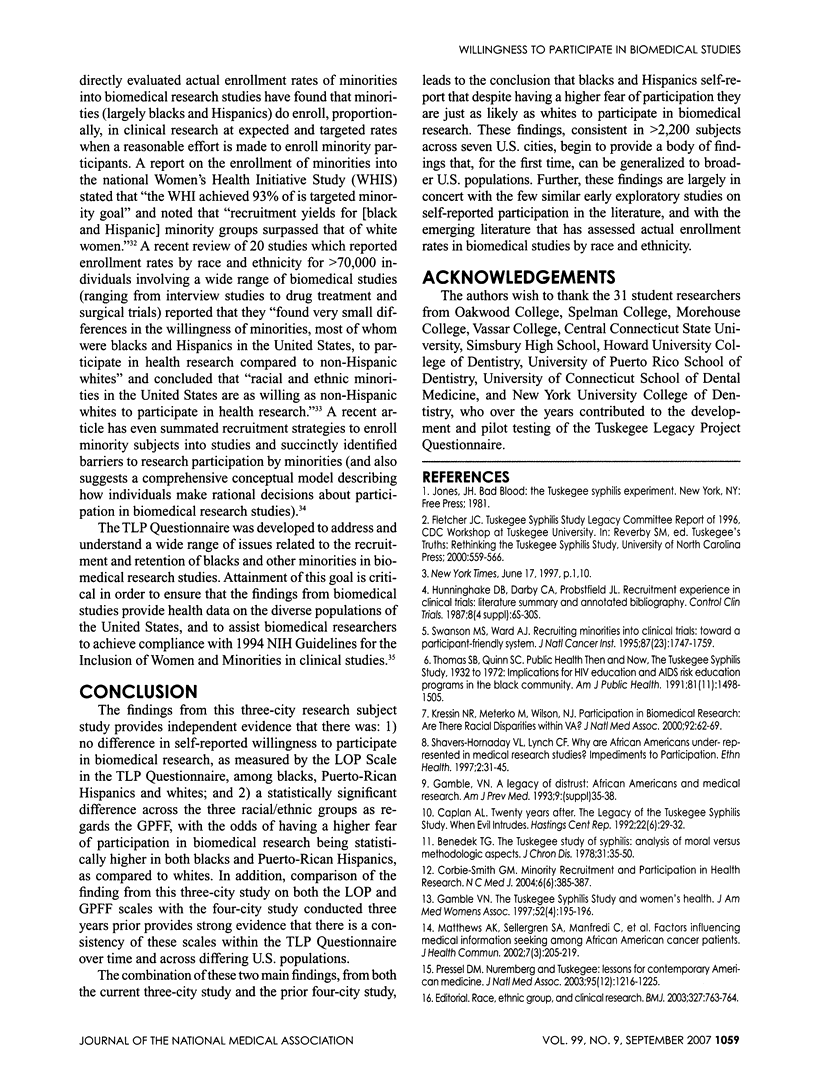
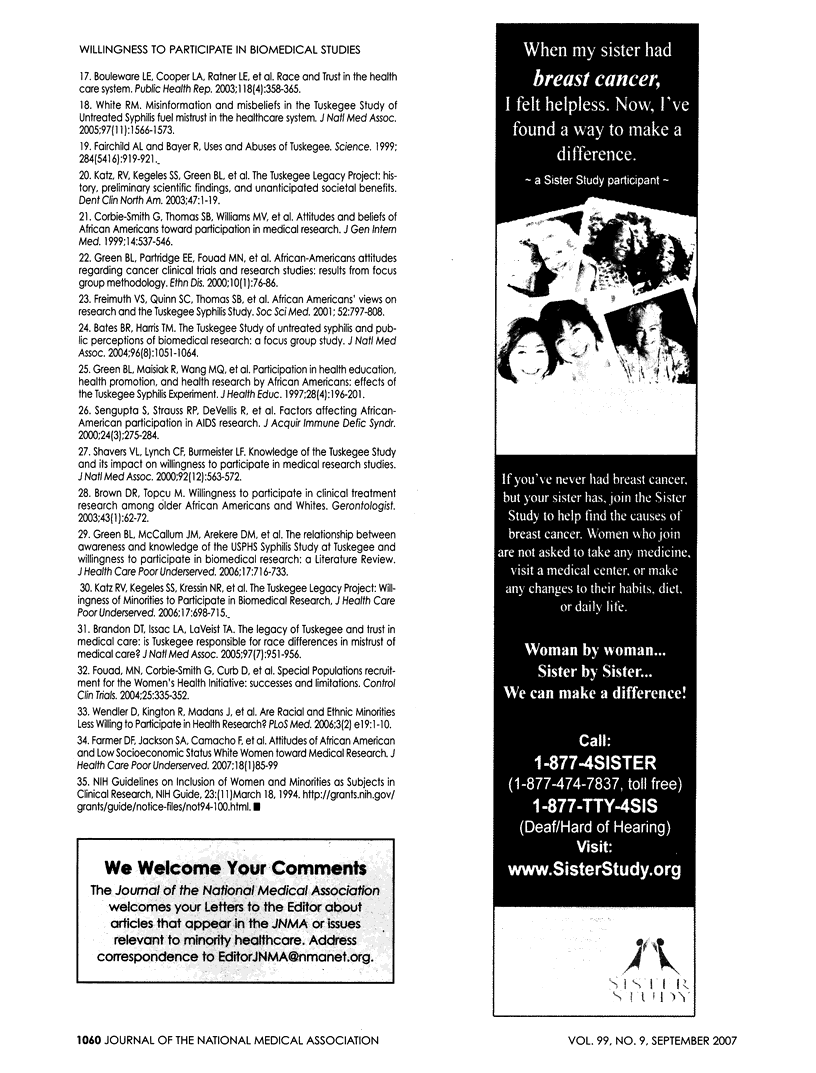
Selected References
These references are in PubMed. This may not be the complete list of references from this article.
- Benedek T. G. The 'Tuskegee Study' of syphilis: analysis of moral versus methodologic aspects. J Chronic Dis. 1978 Jan;31(1):35–50. doi: 10.1016/0021-9681(78)90079-6. [DOI] [PubMed] [Google Scholar]
- Boulware L. Ebony, Cooper Lisa A., Ratner Lloyd E., LaVeist Thomas A., Powe Neil R. Race and trust in the health care system. Public Health Rep. 2003 Jul-Aug;118(4):358–365. doi: 10.1016/S0033-3549(04)50262-5. [DOI] [PMC free article] [PubMed] [Google Scholar]
- Brandon Dwayne T., Isaac Lydia A., LaVeist Thomas A. The legacy of Tuskegee and trust in medical care: is Tuskegee responsible for race differences in mistrust of medical care? J Natl Med Assoc. 2005 Jul;97(7):951–956. [PMC free article] [PubMed] [Google Scholar]
- Brown Diane R., Topcu Meral. Willingness to participate in clinical treatment research among older African Americans and Whites. Gerontologist. 2003 Feb;43(1):62–72. doi: 10.1093/geront/43.1.62. [DOI] [PubMed] [Google Scholar]
- Corbie-Smith G., Thomas S. B., Williams M. V., Moody-Ayers S. Attitudes and beliefs of African Americans toward participation in medical research. J Gen Intern Med. 1999 Sep;14(9):537–546. doi: 10.1046/j.1525-1497.1999.07048.x. [DOI] [PMC free article] [PubMed] [Google Scholar]
- Corbie-Smith Giselle M. Minority recruitment and participation in health research. N C Med J. 2004 Nov-Dec;65(6):385–387. [PubMed] [Google Scholar]
- Fairchild A. L., Bayer R. Uses and abuses of Tuskegee. Science. 1999 May 7;284(5416):919–921. doi: 10.1126/science.284.5416.919. [DOI] [PubMed] [Google Scholar]
- Farmer Deborah F., Jackson Sharon A., Camacho Fabian, Hall Mark A. Attitudes of African American and low socioeconomic status white women toward medical research. J Health Care Poor Underserved. 2007 Feb;18(1):85–99. doi: 10.1353/hpu.2007.0008. [DOI] [PubMed] [Google Scholar]
- Fouad Mona N., Corbie-Smith Giselle, Curb David, Howard Barbara V., Mouton Charles, Simon Michael, Talavera Greg, Thompson Joanice, Wang Ching-Yun, White Cornelia. Special populations recruitment for the Women's Health Initiative: successes and limitations. Control Clin Trials. 2004 Aug;25(4):335–352. doi: 10.1016/j.cct.2004.03.005. [DOI] [PubMed] [Google Scholar]
- Hunninghake D. B., Darby C. A., Probstfield J. L. Recruitment experience in clinical trials: literature summary and annotated bibliography. Control Clin Trials. 1987 Dec;8(4 Suppl):6S–30S. doi: 10.1016/0197-2456(87)90004-3. [DOI] [PubMed] [Google Scholar]
- Katz Ralph V., Kegeles S. Stephen, Green B. Lee, Kressin Nancy R., James Sherman A., Claudio Cristina. The Tuskegee Legacy Project: history, preliminary scientific findings, and unanticipated societal benefits. Dent Clin North Am. 2003 Jan;47(1):1–19. doi: 10.1016/s0011-8532(02)00049-6. [DOI] [PMC free article] [PubMed] [Google Scholar]
- Katz Ralph V., Kegeles S. Steven, Kressin Nancy R., Green B. Lee, Wang Min Qi, James Sherman A., Russell Stefanie Luise, Claudio Cristina. The Tuskegee Legacy Project: willingness of minorities to participate in biomedical research. J Health Care Poor Underserved. 2006 Nov;17(4):698–715. doi: 10.1353/hpu.2006.0126. [DOI] [PMC free article] [PubMed] [Google Scholar]
- Kressin N. R., Meterko M., Wilson N. J. Racial disparities in participation in biomedical research. J Natl Med Assoc. 2000 Feb;92(2):62–69. [PMC free article] [PubMed] [Google Scholar]
- Matthews Alicia K., Sellergren Sarah A., Manfredi Clara, Williams Maryann. Factors influencing medical information seeking among African American cancer patients. J Health Commun. 2002 May-Jun;7(3):205–219. doi: 10.1080/10810730290088094. [DOI] [PubMed] [Google Scholar]
- McCallum Jan M., Arekere Dhananjaya M., Green B. Lee, Katz Ralph V., Rivers Brian M. Awareness and knowledge of the U.S. Public Health Service syphilis study at Tuskegee: implications for biomedical research. J Health Care Poor Underserved. 2006 Nov;17(4):716–733. doi: 10.1353/hpu.2006.0130. [DOI] [PMC free article] [PubMed] [Google Scholar]
- Pressel David M. Nuremberg and Tuskegee: lessons for contemporary American medicine. J Natl Med Assoc. 2003 Dec;95(12):1216–1225. [PMC free article] [PubMed] [Google Scholar]
- Sengupta S., Strauss R. P., DeVellis R., Quinn S. C., DeVellis B., Ware W. B. Factors affecting African-American participation in AIDS research. J Acquir Immune Defic Syndr. 2000 Jul 1;24(3):275–284. doi: 10.1097/00126334-200007010-00014. [DOI] [PubMed] [Google Scholar]
- Shavers-Hornaday V. L., Lynch C. F., Burmeister L. F., Torner J. C. Why are African Americans under-represented in medical research studies? Impediments to participation. Ethn Health. 1997 Mar-Jun;2(1-2):31–45. doi: 10.1080/13557858.1997.9961813. [DOI] [PubMed] [Google Scholar]
- Shavers V. L., Lynch C. F., Burmeister L. F. Knowledge of the Tuskegee study and its impact on the willingness to participate in medical research studies. J Natl Med Assoc. 2000 Dec;92(12):563–572. [PMC free article] [PubMed] [Google Scholar]
- Swanson G. M., Ward A. J. Recruiting minorities into clinical trials: toward a participant-friendly system. J Natl Cancer Inst. 1995 Dec 6;87(23):1747–1759. doi: 10.1093/jnci/87.23.1747. [DOI] [PubMed] [Google Scholar]
- Thomas S. B., Quinn S. C. The Tuskegee Syphilis Study, 1932 to 1972: implications for HIV education and AIDS risk education programs in the black community. Am J Public Health. 1991 Nov;81(11):1498–1505. doi: 10.2105/ajph.81.11.1498. [DOI] [PMC free article] [PubMed] [Google Scholar]
- White Robert M. Misinformation and misbeliefs in the Tuskegee Study of Untreated Syphilis fuel mistrust in the healthcare system. J Natl Med Assoc. 2005 Nov;97(11):1566–1573. [PMC free article] [PubMed] [Google Scholar]


